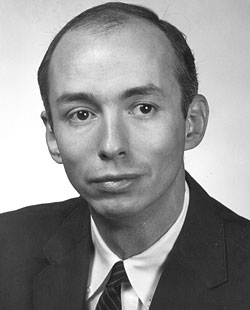‘The epitome of a teacher-scholar’

John Archer Carter Jr.
John Archer Carter Jr., who taught British and American literature from 1961 until retiring in 1997, died August 4 in Winston-Salem. He was 77. He is survived by his wife, Lee Culmer Carter (’64).
One of his close friends and colleagues, Professor of English William Moss, remembered him as “the epitome of a teacher and scholar.”
“John Carter was the kind of professor who made Wake Forest what it became,” Moss said. “His legacy is not a list of unread articles and books, but a host of enlightened and inspired students and colleagues. He was a rigorously demanding teacher, whose classes were always full. He demanded the best of his students, of his colleagues and especially of himself.”
Provost Emeritus Edwin G. Wilson (’43) called Carter “one of Wake Forest’s most brilliant teachers. He respected the English language and used it with precision and wit. He was a gifted interpreter of the great Victorian novelists, especially Dickens and Hardy, whom he knew with the kind of intimacy and thoroughness that only years of reading and studying could have brought about. He was also keenly alert to the subtleties of poetry, and, though perhaps only a few friends knew it, he on occasion wrote short poems, usually sonnets, which were remarkable for their carefully concentrated power.”
Carter also taught in the Interdisciplinary Honors program. “Besides his passion for literature, he had a considerable knowledge of art, music and the workings of the natural world, and a readiness to learn more about all of them,” said Professor Emeritus of History James Barefield, who taught with Carter in the Interdisciplinary Honors program. “He shared what he knew, encouraged the responses of students, and, with his fine sense of the ridiculous, tolerated their flights of fancy and those of his fellow teacher. He was an ideal colleague.”
Carter was born in Virginia and attended the University of Virginia and Princeton University, where he earned a Ph.D. in British Literature. He served in the United States Army for three years, then taught at the University of Virginia for four years. During his tenure at Wake Forest, he was chair of the English department and president of the University Senate, and he served on numerous committees. He was active in the Victorian Periodical Society, serving as vice president and president.
Professor and Chair of English Claudia Thomas Kairoff remembers Carter “as an extraordinarily well-read and dedicated teacher. He mentored many students and young faculty members, who then remained devoted to him until his death.”
Professor of English Barry Maine, a former department chair, remembers Carter best for the interest he took in teaching and scholarship: “He believed in the concept of a community of scholars at Wake Forest. During all the years we served together he was always actively engaged in perfecting the mission of the department.”
Former students recall Carter with equal fondness. Betty Lewis Richwine (’65) had Carter in 1961 for freshman English. “He was a young and sage professor – tough but fair,” she said. “I learned so much from him and managed to take every course he taught.”
Laura Elliott Behm (’79) remembers taking a Dickens seminar taught by Carter: “Imagine the privilege of sitting in the seminar room with only 12 other students and Dr. Carter, as we read every single one of Dickens’ works during the course of the semester. Dickens was one of his great literary loves, and Dickens’ work brought out Dr. Carter’s delightful but wry sense of humor. His astute analysis of Dickens’ compassionate characterizations and writing technique helped build my own sense of story and writing. He also was a generous mentor outside the classroom.”
Carter was nominated multiple times for the Jon Reinhardt Award for Distinguished Teaching. One of the students who nominated him was Timothy Graham (’76). “Dr. Carter taught me how to write clearly, succinctly and logically,” recalls Graham. “He probably saved my academic career at Wake Forest. I doubt that I would have survived other courses during those years which required a great deal of writing without his help. His caring attitude and willingness to help all of his students, regardless of their ability in his subject, continue to influence me.”
Carter’s example in the classroom helped lead Cathrine Frank (’93) to earn a doctorate in 19th and 20th century English literature and to a career as a faculty member at the University of New England. “As a teacher myself now, I can look to Professor Carter for a lesson in how to respond [to students]: never lower your standards but instead give them what you know and allow them to exert themselves; be critical and insist on good work, but never be caustic and remember to praise; remain open to their ideas and the possibility that they can influence your thinking, and, finally, respect them.”
Categories: Mentorship, University Announcements
Media Contact
Wake Forest News
media@wfu.edu
336.758.5237



